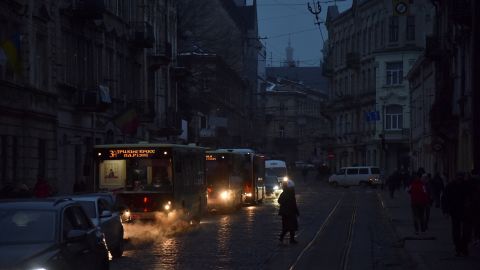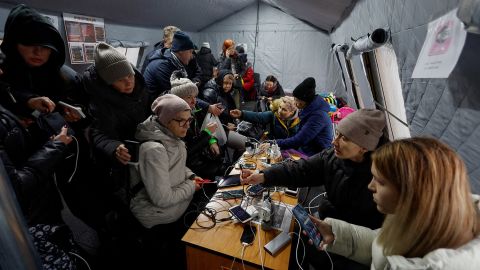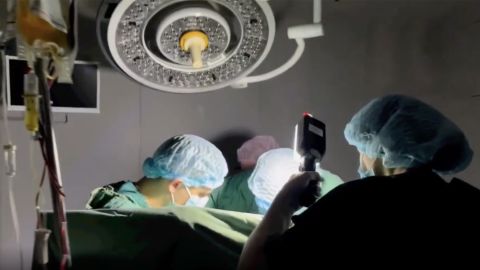The national energy company Ukrenergo said work was “taking longer than after previous attacks” because Wednesday’s assault targeted power generation facilities and caused a “systemic incident.”
By Thursday afternoon, electricity had been restored to “all regions” but individual households were still “gradually being connected to the grid,” Kyrylo Tymoshenko, an official in President Volodymyr Zelensky’s office, said on Telegram.
The Ukrainian armed forces said 70 Russian missiles were launched on Wednesday afternoon and 51 shot down, along with five attack drones.
The attack killed at least 10 people, including a teenage girl, and “led to the temporary de-energization of all nuclear power plants, and most thermal and hydroelectric power plants,” the Ministry of Energy said. It left much of the country without power, with knock-on effects on heating, the water supply and internet access in some areas.
Wednesday was the first time that Ukraine’s four nuclear power plants were simultaneously shut down in 40 years, the head of state nuclear energy company Energoatom said in a statement. Petro Kotin said it was a precautionary measure and that he expected they would be reconnected by Thursday evening. The three fully functioning plants in Ukrainian hands – the occupied Zaporizhzhia plant has not been operating since September – would help supply electricity to the national grid, he said.
Ukraine is heavily dependent on nuclear energy, according to the World Nuclear Association. It has 15 reactors at four plants that, before Russia’s full-scale invasion in February, generated about half of its electricity.
Russia has turned its attention to destroying energy infrastructure in Ukraine ahead of the bitter winter season, and successive waves of strikes have left much of the country facing rolling blackouts.


Surgeons operate by torch light
Wednesday’s strike caused havoc across the country, with the capital Kyiv, the western city of Lviv and the entire Odesa region in the dark.
People who had taken shelter from the airstrikes in the capital left bunkers to find their homes without power and scrambled to find a place for the night with friends or family. One in four homes in the city was still without electricity Thursday morning. While the water supply was restored to all districts by mid-afternoon, it was still not working at full capacity, with those in high-rise buildings experiencing low water pressure, Mayor Vitalii Klitschko said.
Video from the Reuters news agency showed people in the capital queuing to collect water from public wells in the pouring rain.
Hospitals relied on generator power or even head torches worn by staff as they continued to perform operations.
In one Kyiv hospital, doctors were performing heart surgery on a child when the power went out. Dr. Borys Todurov posted a video on Instagram that showed surgeons working by the light of their headlamps as they waited for the generator to kick in.
The director of a hospital in the central Dnipropetrovsk region, across the river from the Russian-occupied Zaporizhzhia nuclear power plant, said “tens of patients in a critical condition were on surgery tables at Mechnikova Hospital” when the blackout hit.
“Anesthesiologists and surgeons put on headlights to save each of them,” Dr. Sergii Ryzhenko wrote on Facebook. He posted a photo of two doctors, who he said were Yaroslav Medvedyk and Kseniya Denysova, operating on a 23-year-old man when the electricity went down – “for the first time in 35 years of Yaroslav’s practice.”

EU vows further sanctions
Zelensky requested an urgent meeting of the UN Security Council following the strikes, which met with swift condemnation from Ukraine’s allies.
The European Union announced it would prepare a ninth package of sanctions against Moscow, in what European Commission President Ursula von der Leyen said was an attempt “to blunt even further its capacity to wage war on Ukraine.”
French President Emmanuel Macron said Russia’s attack demanded a response. “Ukraine suffered massive shelling today, leaving much of the country without water or electricity. Strikes against civilian infrastructures are war crimes and cannot go unpunished,” he tweeted on Wednesday night.
Poland said Wednesday the Patriot missile defense system that Germany had offered Poland should go to Ukraine instead. “After further missile attacks (from Russia), I turned to (Germany) to have the proposed (Poland) Patriot batteries transferred to (Ukraine) and deployed at the western border,” Polish Defense Minister Mariusz Blaszczak said on Twitter. Germany’s offer to Poland came after a missile hit Polish territory near the Ukrainian border on November 15, killing two people.
Kremlin spokesman Dmitry Peskov said Thursday that Ukraine’s leadership could stop the suffering by meeting Russia’s demands.
“The leadership of Ukraine has every opportunity to bring the situation back to normal, has every opportunity to resolve the situation in such a way as to fulfil the requirements of the Russian side and, accordingly, stop all possible suffering of the local population,” Peskov said in a call with reporters.
Meanwhile, Ukraine’s defense ministry sent a tweet Thursday marking nine months since Russia’s February 24 invasion.
“Nine months. The amount of time in which a child is born. In nine months of its full-scale invasion, Russia has killed and injured hundreds of our children, kidnapped thousands of them, and made millions of children refugees,” it said.
As reported by CNN
